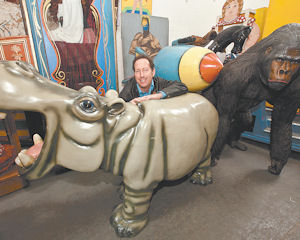A few years back when a building near prop house Lennie Marvin Enterprises Inc. became vacant, company co-owner Keith Marvin passed on it. He was not ready to expand just yet. But the timing was right for the additional space about five months ago. Now the building is the Burbank company’s third and has been transformed into a department-store-like setting so that set decorators and art directors can see what is offered for rent. Better presentation of the props has resulted in more rentals and the added space allows Marvin to aggressively go after new items. “You cannot stand pat,” said Marvin, who operates the business with his father. “In any business you can’t; especially in this industry where the same customers come in and want to see something new. You have to upgrade.” Marvin’s upgrade at “Prop Heaven” illustrates what the climate is like now for small businesses. After an extended period in which the goal for business owners was just to survive and keep the doors open, 2011 now ushers in a period of maximizing opportunities as is being done by Marvin, the Voogt brothers in Van Nuys, and retailer Alegre Ramos in Valley Village. “It’s shifted toward people managing the positive results we are starting to see,” said Steve Tannehill, the director of the Small Business Development Center at College of the Canyons in Santa Clarita. Not that things have improved all over. Banks still maintain stiff conditions to lend money and there are certain industry sectors – construction, for instance, or shops catering to discretionary consumer spending – that continue to do poorly. John Doyle, a counselor and president of the Los Angeles chapter of SCORE, a program of the U.S. Small Business Administration, sees first hand what small business owners encounter. When the recession was at its worst those coming to SCORE for its counseling services and workshops on starting a new business tended to be people who had been laid off from their jobs. In recent months, the client base favors existing business owners with growth on their mind by adding to their physical space or product line. There are a lower percentage of clients who want to start restaurants, Doyle said. Two chartered financial analysts came in for counseling this month who wanted to start a consulting business. Sectors improve At the SBDC, which offers counseling and mentoring services, there has been a pick-up in small manufacturers and import/export type businesses are doing well, Tannehill said. Retail is still considered attractive particularly for those moving from online sales to a brick-and-mortar store or supplying specialty grocers like Whole Foods or Trader Joe’s. With consumers still focused on the price of goods, being a retailer is not as easy as Ramos has found with her Green and Greener eco-living shop on Laurel Canyon Boulevard. Her green boutique is one of only three still in Los Angeles as other such shops folded during the recession. While having regular customers is a good thing, she is faced with the challenge of bringing in new people, Ramos said. When consumer spending was at its lowest, she followed a strategy of being lean, conservative, slow to hire and always watching the cash flow. “I adhered to what are called old fashioned ways of doing business and that made sense,” Ramos said. “You do not spend money that you do not have.” Money is on the minds of brothers Perry and Randy Voogt, owners of All Valley Hose & Industrial Supply, a Van Nuys hydraulic hoses and fittings distributor. Tough credit climate Opportunities are boundless for the company that finished 2010 with revenues 30 percent higher than the year before. As competitors closed their doors and others cut back in staffing, that brought more orders to All Valley. The only thing holding the company back, said Perry Voogt, is the “laughable” credit situation. Working with a consultant from the SBDC, the brothers tightened up their receivables and extended the terms of their payables to vendors. But to take the next step it will take a bank loan, which isn’t easy to get. “They want our business but in each case we don’t fit the right profile,” Perry Voogt said. “We are too big or too small.” While the SBDC works with companies that are receiving loans there are still a lot that are getting an infusion of capital from families and friends. Banks are being challenged in regards to loans as they often have regulators coming in and looking at who they lend to, Tannehill said.
